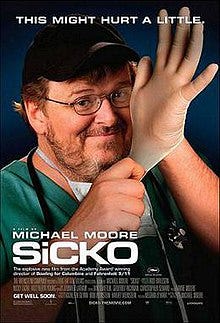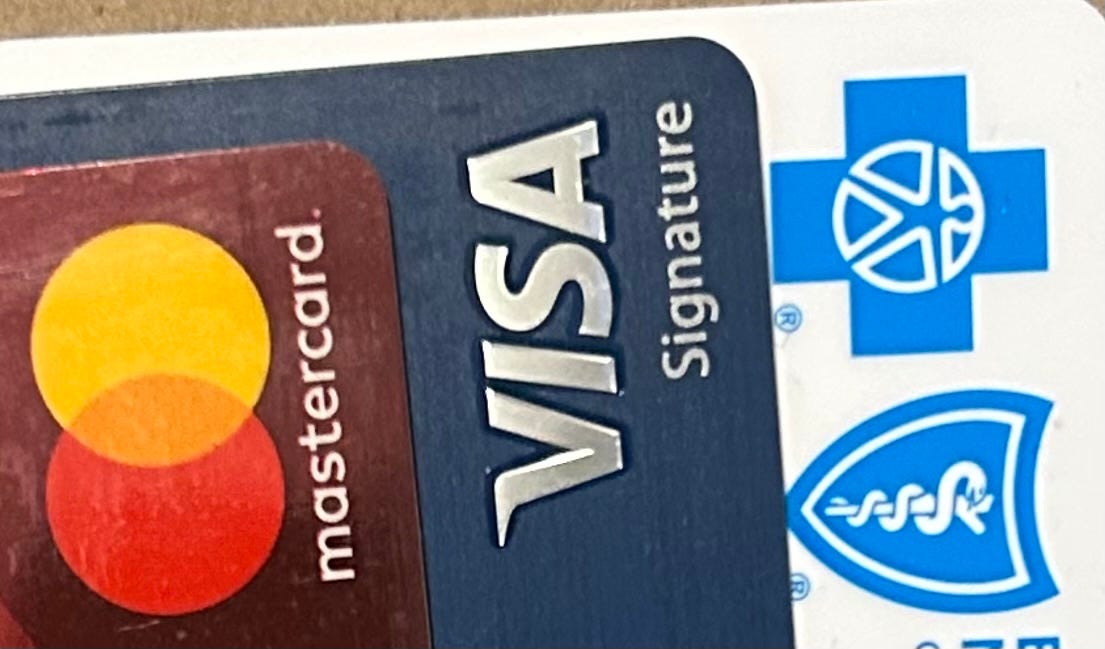The recent renewal of interest in the continuing failures of the US health care system has reminded me of times in the past when this was a hot topic*. Centrists and even many progressives have been telling us for decades that single-payer systems with universal coverage are unworkable, either practically, financially, or politically.
I am not convinced. Here’s something I wrote back in 2007 on another social media site.
Many years ago I heard someone say that instead of paying for health insurance for several years, he would have been better off taking his chances without it and maxing out his credit card to pay his medical bills if he had gotten sick. I don't know if the numbers would support this specific claim, but got me to thinking. Why not use some form of guaranteed credit as the basis of a single-payer system? Here's how it might work:
Basically, everyone would have the equivalent of a health care credit card (HCCC) that could only be used for medical expenses. Medical expenses would be paid directly to health care providers by the government, just like merchants are paid by VISA or MC for consumer's purchases. The government would in turn debit patients' HCCC account. Patients would then have to pay the bill just like any other credit card. Unlike credit cards, however, the minimum monthly payment could be based on income rather than the size of the debt, and the interest rate would be limited.
That's the core of this idea. Here are some other features:
1) People with no medical expenses would still be required to pay a small part of their income into their accounts on a regular basis (i.e., the HCCC account would in effect also be a health care savings account). They would receive interest for these deposits. Accumulated savings could be transferred to the accounts of spouses or dependent children if a family member got sick.
2) People could still have private health insurance which they or their employers would pay for. Upon receiving a bill from the government, they would file a claim with their insurers for reimbursement. But health care providers would never have to deal with insurers in order to be paid. [So this would be “single payer” for health care providers, but not for insurers.]
3) Certain preventive procedures like annual checkups and prenatal care would be free (the government would pay, and would not require reimbursement).
4) The government would not pay at all for certain elective procedures, such as purely cosmetic procedures.
5) There would be price ceilings (based on "usual and customary" prices) on all procedures not falling under 3) and 4). Health care providers could charge less than the ceiling (to compete for customers, or for charity), but charging more would disqualify them from the government reimbursement plan. [Health care providers would have to be transparent about their pricing, so that consumers could comparison shop.]
6) As stated above, employers could still pay for health insurance if desired. Employers who wished to provide a health care benefit would also have the option of depositing a tax-free "health care allowance" directly into employee's HCCC accounts as a possible substitute for insurance. Depending on revenues, it might also be possible for the government to grant a yearly health care allowance.
Patients, doctors, and employers would be better off under this plan. The advantage of this system for patients would be primarily in terms of security. Under this system, patients would know that medical care would always be available--there would be no instances of people being denied health care as was shown in [the documentary] Sicko, because health care providers would have no financial incentive to deny care. The advantages for health care providers would be in greatly reduced administrative costs (since they would no longer have to deal with insurers), which would allow savings that could be passed along to patients. Insurance companies would be the losers under this system. They would not be put out of business automatically, but they would lose the control that they now exert over health care, and there would be less demand for their "products".
Health care would not be cheap under this system, but it would be accessible and affordable. People with heavy medical expenses would incur a load of debt, but that occurs anyway, and at least they would know that they could get the care they needed. Health care costs would not rise because consumers would have incentives to resist unnecessary procedures and take advantage of free preventive care.
It's hard to say whether this system would be self-financing or would run at a loss to the government that would be paid for by taxes. The government could of course use various coercive methods to make sure people paid their bills [such as withholding tax refunds or garnishing wages]. The government could also contract out the actual administration of the system to private credit card companies to increase efficiency.

*Specifically 1992-1994 and 2007-2010. Bill Clinton ran, in part, on healthcare reform, but when he was elected, his administration’s Health Care Task Force, headed by Hillary Clinton, decided that the single-payer system that activists wanted was politically unfeasible, and instead came up with an employer-based plan that proved to be even less viable politically. They could neither get their plan through Congress nor sell it to the public, and healthcare reform was effectively tabled for another generation. By 2007 it was again an issue, as evidenced by Michael Moore’s film, and the presidential candidates of both parties were promising to do something about it. The Affordable Care Act (“Obamacare”) was passed in 2010.



